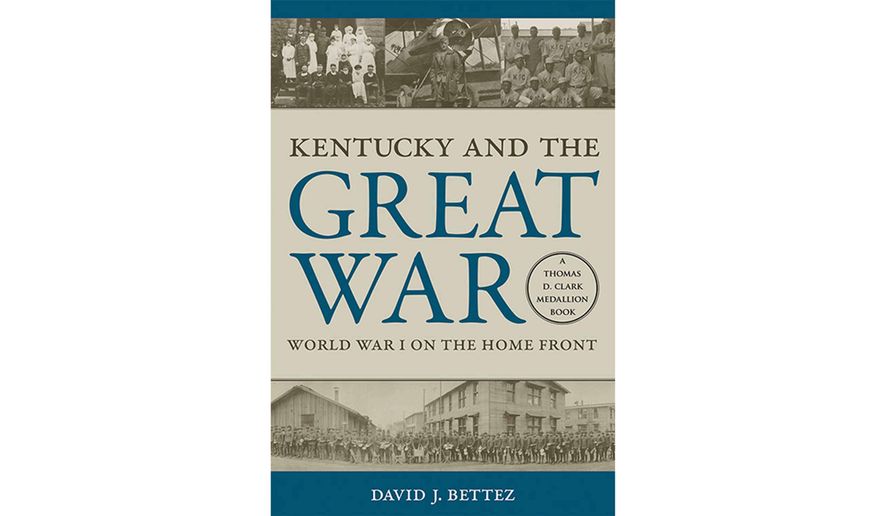OPINION:
KENTUCKY AND THE GREAT WAR: WORLD WAR I ON THE HOME FRONT
By David J. Bettez
University Press of Kentucky, $45, 428 pages, illustrated
Neither of the two best-known American soldiers of World War I, Gen. John J. Pershing and Sgt. Alvin York were Kentuckians (although York hailed from neighboring Tennessee), but this book makes a strong case for Kentucky’s importance in the war effort. Its twin strengths of energy (oil as well as coal) and agricultural production — both beefed up to adjust from a peacetime economy — were vital. It had the lowest rate of draft dodging in the United States and so provided more than its share of doughboys, blacks as well as whites, despite the segregated society they were fighting for and the equally segregated military where they were serving.
As biographer David J. Bettez writes, “A striking feature of Kentucky during the Great War was the overall willingness of most people in even the smallest communities to contribute. Kentuckians oversubscribed to Liberty Loan, Red Cross, and other fundraising campaigns in the latter part of the war.” “Kentucky and the Great War” provides ample evidence to demonstrate that on the home front, as well as on stormy, U-boat-infested seas and far-off battlefields, Kentucky and its people did their bit and then some.
The book’s focus is on local endeavors and issues and fascinating they are. We learn that Kentucky was the third state to ratify the 18th Amendment to the U.S. Constitution, which would bring about nationwide Prohibition. This from a state sharply divided between “Drys” and “Wets,” many of the latter with a vested interest in Kentucky’s signature product bourbon whiskey, both as consumers and, perhaps more importantly, distillers and marketers.
Hugely increased agricultural production combined with restraint on the home front in the form of Meatless Tuesdays and Wheatless Wednesdays pretty much sums up the attitude which accepted that sacrifice on the home front was necessary for those fighting overseas to enjoy the best eats their country could give them. And let’s not forget that other product servicemen in those days deemed almost as necessary as food: the book quotes Gen. Pershing: “You ask me what could win the war. I answer tobacco, as much as bullets.” Kentucky’s farmers helped meet this demand and prospered doing so.
It is no accident, it seems to me, that Mr. Bettez uses the term Great War rather than the more commonly used ones for that first global conflict of the 20th century. For the fact is that, unlike the United Kingdom, France, Russia, Serbia, Italy and so many other nations on whom it took a terrible toll, the United States actually did complete its last step toward not just to being a great power but the world’s pre-eminent one by fighting the First World War. It was certainly the only country not to emerge exhausted, but actually multifariously enhanced, at the conclusion of hostilities. Not to minimize the casualties — the deaths, terrible maiming and mutilations, and gas-ravaged lungs suffered by American soldiers — but the much shorter duration of the United States’ war prevented it from being ruined as were most of its allies.
So far from being weakened, the United States emerged from the war at the global pinnacle: industrial, commercial, agricultural and political. It will not be pleasurable for those who believe in free markets for all seasons to remember that this extraordinary achievement in only a year and half was achieved by almost total federal government control of every component of the war economy from factories to railroads. Not to mention some of the highest taxation in our history. Yet could such an enormous task been accomplished with the necessary dispatch in any other manner? And of course, it was not institutionalized or even used as the thin end of the wedge: once the war was successfully prosecuted, that often mocked “return to normalcy” allowed free-market capitalism to flourish again.
As Mr. Bettez neatly sums up, “For a period of nearly two years during the Great War, Kentuckians sublimated their differences to pursue a larger goal: supporting America’s war effort. Their differences did not disappear, and issues such as Prohibition and women’s voting rights still engendered disagreement. During the Great War, however, Kentuckians of both genders; of all races, religions, political affiliations, and social backgrounds; and from all locales banded together to support the war. They personified the first part of the commonwealth’s motto: United We Stand, Divided We Fall.”
The spirit of that motto, which also recalls slaveholding Kentucky’s refusal to secede during the Civil War, certainly contributed to the state’s outstanding contribution to the war effort. And despite the author’s proud advocacy for Kentucky’s unique status, its endeavors inevitably provide a microcosm for the nation’s showing as a whole. It also provides an enduring reminder of the virtues of shunning divisiveness and instead embracing patriotism and devotion to a necessary common purpose.
• Martin Rubin is a writer and critic in Pasadena, Calif.




Please read our comment policy before commenting.